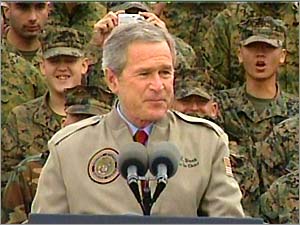Unembedded: Four Independent Photojournalists on the War in IraqPhotographs by Gaith Abdul-Ahad, Kael Alford, Thorne Anderson, Rita Leistner
Forward by Philip Jones Griffiths, Introduction by Philip Robertson
Chelsea Green, cloth $50.00, paper $29.95
A review by G. Randy Primm During the Vietnam War, we saw it all, and we saw it all the time; it was on TV, in the pages of Life, Time and Newsweek, and on the front pages of every newspaper in the world: horrifying images of war. We saw assassinations of suspected Viet Cong agents, napalmed children, emotionally wasted combat infantrymen, torched hooches and immolated monks. But with the passage of time, the pictures had their desired effect, and finally the American public had had enough. Conventional wisdom these days has it that the pictures really didn’t do all that much to end the war; it was the doomsday pronouncement by Walter Cronkite, CBS news anchor and American icon, that the war was truly lost that finally caused the administration to throw in the towel, but the images from the printed press as well as the nightly newsreels certainly contributed.
Interestingly, the editors at Time/Life, in their book Life: 100 Photographs That Changed the World, comment, “[During WWII], President Franklin D. Roosevelt was convinced that Americans had grown too complacent about the war, so he lifted the ban on images depicting U.S. casualties.” But the military was always dubious; the Pentagon saw unrestricted (albeit occasionally censored) photo access as detrimental to the war, and probably a contributing factor to mission failure.
The policy of embeddingIt took some years and several more military actions to finally settle on a policy and process that was amenable to both the press and the military. After Vietnam, they changed their policy on combat reporting several times. In Panama and Grenada, the press was barred completely until after the action had all but ceased; in Somalia, the press turned the tables by arriving ahead of the invasion and ended up sitting on the beach and welcoming the marines with hoots and cheers. With Operation Desert Storm, the press had all the nose cone video tape that they could stand and then some. But with the aid of the redoubtable RAND Corp., a policy was finally arrived at that seemed to make everyone - publishers, military and public - happy: "embedding."
With embedding, print and video reporters are permanently assigned to a particular combat unit and live with them, dodging bullets and bombs with them and getting killed with them. Reporters Without Frontiers estimates 73 journalists KIA in Iraq so far, from multiple press agencies and countries. But here’s the kicker: no more free rides; if the embedded journalist leaves his assigned unit, he is basically abandoned by the military (“retrograded”), with virtually no recourse, and if he travels alone, he is in extreme danger. Robert Fisk, Middle East correspondent for the UK Independent, estimates that he has about 12 minutes of street time after he leaves his hotel in the Green Zone to get his story and get back to the hotel before he is
targeted by whomever, including by American forces.
This war is vicious, and civilians are dying or are severely injured right beside the so-called “insurgents”; some by suicide bombers and others by stray howitzer shells, phosphorus, friendly fire, napalm, the whole bit. Sabrina Tavernise of The New York Times calculates (Oct 30, 2005) that civilians are dying at a rate of about 63 a day, with the number of wounded almost impossible to estimate because of the lack of coverage. But we don’t see this carnage because they are dying out of range of the camera lenses for the most part, and because most of the death and injury is to them, the other guys, and the bystanders, mostly women and children. but these images of Iraq are mainly unseen by the American public because, just as the American style of modern war is long range, so too is the visual imagery that is coming out of it.
So were the videos and stills that came out of Desert Storm real réportage, or just agitprop? Does the coverage from the embedded reporters in Iraq today reflect the reality of today’s Operation Enduring Freedom? Where are the images of the bombed houses, gutted hospitals, burning mosques and the innocent dead? We know this is happening, but where are the pictures? Is there any publisher in the American press who would continue the legacy of Henry Luce, founder of Life magazine (now moribund) who once said of his magazine’s mission, “To see things a thousand miles away, things hidden behind walls and within rooms, things dangerous to come to...”?
Times have indeed changed, and probably not for the better.
The photographersIt is beyond the scope of this review to go into the politics of why the American press has held back on publishing images of this war, other than those clichéd pictures of burned-out Humvees or stylish close-ups of soldiers standing at Iraqi check points, and certainly no graphic pictures of the American dead or even the Iraqi dead, civilian or otherwise. Suffice it to say that it is ‘not convenient,’ and we will discuss that issue later. Thankfully, the rest of the world press has no such editorial reluctance, and the more graphic images in this book have found their way into many of the rest of the world’s editorial pages, if not the American press.

I have spent nearly ten months in Iraq – almost all of that time “embedded” with the Iraqi people themselves. I traveled with American soldiers for a few days, and it was like being in a plastic bubble. From the American Humvees I could see the Iraq that I know, but there was no interaction with it. The Americans have almost no cultural contact with Iraqi people. They may have an occasional chat with some random Iraqis who pass by, but the American soldiers don’t make Iraqi friends over time, they don’t eat in their homes, visit their mosques, play with their children, go to weddings, play dominoes, or take afternoon naps with them. – Thorne Anderson
The photographers themselves are a motley crew: Thorne Anderson, an American; two women: Canadian Rita Leistner and American Kael Alford, and a Baghdad native and former Iraqi soldier, Ghaith Abdul-Ahad. All but Ghaith were full-time photojournalists before coming to Iraq. Ghaith was an architecture student in Baghdad before the war, and his photography is apparently self-taught. It’s obvious from looking at their photographs that they are all possessed of nerves of steel and an intense desire to document what is really happening in Iraq outside the Green Zone, where the war is killing the Iraqis we’re supposed to be bringing democracy to.
The military calls them “unilateral” journalists, operating outside of official sanction, hence, the “unembedded.” They may or may not have official press credentials, they may be stringers or on assignment, one is even a native Iraqi, but they are not officially recognized, they are barely tolerated and they get minimal support from the military or space in the American press. They do deliver honest images of this particular war, from close up, the way it should be done.
The photographsThere are some critics of photography who maintain that photographic coverage of war is not for information’s sake, but to boost the sales of magazines, newspapers and TV time. In fact, critic/deconstructionist Mario Cutajar, in a review of a recent showing of James Nachtwey’s photos at the Los Angeles Fahey/Klein Gallery, accused those who would defend combat photography as news-gathering as “naive” and possibly cynical. This would make the military’s policy of not showing pictures altruistic, perhaps?
This is not a book of aesthetic war photography, a la Nachtwey, who has often been accused of being a disaster aesthete. No, this is not war as art, and this is not a critique of the aesthetics of the photographs; it is obvious that these pictures were taken by professionals; with that said, these are news photographs. Many of them are badly framed or shot in poor light; composition is frequently out the window as many of these pictures were taken on the run or from inside jostling crowds. They are, however, full of content, following the dictum, “fill the frame.” Content is the issue here and content is what we get.

In the suburbs, US missiles went wrong or landed close to brittle cinder blocks housing that collapsed on whole families in their sleep. By the third week of bombing, the communications and telephone exchanges had been destroyed, so no one could call for help. In Saddam City Medical Center, casualties filled the rooms and lined every hallway. I photographed doctors setting bones, sewing stitches, and treating burns on patients without anesthesia. The ambulances were broken down, and drivers said they didn’t know where to find the injured anyway. These stories multiplied as the air raids grew to a crescendo before the Americans’ final push to Baghdad, until one editor asked, “Please don’t send any more wounded civilian pictures.” – Kael Alford
This is not to say that blood does not sell. Obviously, if you’re trying to make a point - in this particular case, attempting to bring attention to the unnecessary damage being done in Iraq – it is not out of line to show a grisly scene or two. And while there are grisly images in this book, a large amount of space is given over to the side effects of the ceaseless pounding this people have been subjected to. Rita Leistner, for instance, focuses on the patients of a Baghdad psychiatric hospital, a la Mary Ellen Mark, of which Rita’s work is reminiscent. Again, this is straight-ahead photojournalism, and brings our attention to a subject that is often overlooked in any telling of the war effort: the bystanders who, while not specifically targeted, are double victims, of the war and of their own inner turmoil.
Rita shows us the inmates of the Rashad psychiatric hospital. Plain walls, caged TV sets, naked pain. The composition is formal, the settings minimal, but the anguish of the patients is projected through her frame like a blowtorch.
There is a fear among many Iraqis, the doctor told me, that if one daughter has a mental disorder the family won’t be able to marry off any of the other daughters. So they are sent to Rashad, cast away from society by their families, who will often provide false addresses so hospital staff can never find them again. Some mentally healthy women find refuge at the hospital from beatings and honor killings, a traditional code that has resurfaced in the instability of postwar Iraq. Most of the women have no choice but to live at the hospital for the remainder of their lives. –Rita Leistner
Ghaith Abdul-Ahad lived on the run in Baghdad, taking his pictures on the fly – the very essence of street photography - slipping through the American lines by posing as a stringer for a British newspaper, then plunging back across the lines and into the maelstrom as an alleged reporter for whomever. That’s got to be nerve-wracking. Damn few sane people I know would do that for the sake of mere ‘art’ photography. On his travels, he stopped to record the aftermath of US helo gunships which had opened fire on a crowd celebrating around the burning hulk of a US Bradley Fighting Vehicle: it’s not clear how the Bradley came under attack, but Ghaith reports at least two strafing runs of the gunships on the civilians on Haifa Street, a main Baghdad boulevard. Upon examination of the wide-angle shot of the street scene of fleeing civilians with a magnifying glass, I couldn’t spot a single civilian with a gun. What we do see are many dead Iraqis. Ghaith takes some responsibility.
We left the kids to die there alone. I didn’t even try to move any with me. I ran into the entrance of a building and someone grabbed my arm and took me inside. “There’s an injured man. Take pictures. Show the world American democracy,” he said. [...] All the people I had shared my shelter with were dead. Every time I look at these pictures I tell myself I have killed those people. I should have helped them instead of taking pictures. – Ghaith Abdul-Ahad
War is hell, as the general famously said, but each generation seems to forget that truth, preferring to let the images of that hell die. This is all too easy to let happen. We live in a time with remotely controlled TV sets, airplanes, bombs and armies. Governments are all too happy to control what we see, and thus to control what we think and feel. We are fortunate that this band of journalists has brought these pictures to our attention.
These images are reminders that hell does exist on earth; it is required of us to look at these pictures, to really look and understand what we have done to these people. They are not inconvenient; they are our fellow human beings. If we let these pictures die, then we will have died a little bit as well: to the truth, to life, and to mercy.
------------------------------------------------------------------------------------------------------------
Notes:
While this book stands alone as testimony to the waking nightmare that is present-day Iraq,
Unembedded is also the companion book to a national touring exhibit of photographs of the Iraq conflict, scheduled to start a run across the United States beginning in early 2006.
For more images from Iraq, please see
Robert Fisk: Iraq war images. Additionally, for the view from the other side, a startling video of snipers killing Coalition troops, apparently produced by the insurgents themselves and via
BNP TV is
here. (wmv file, 25 mb)
Warning: graphic violence.
Update: The BNP video has since been taken down.










